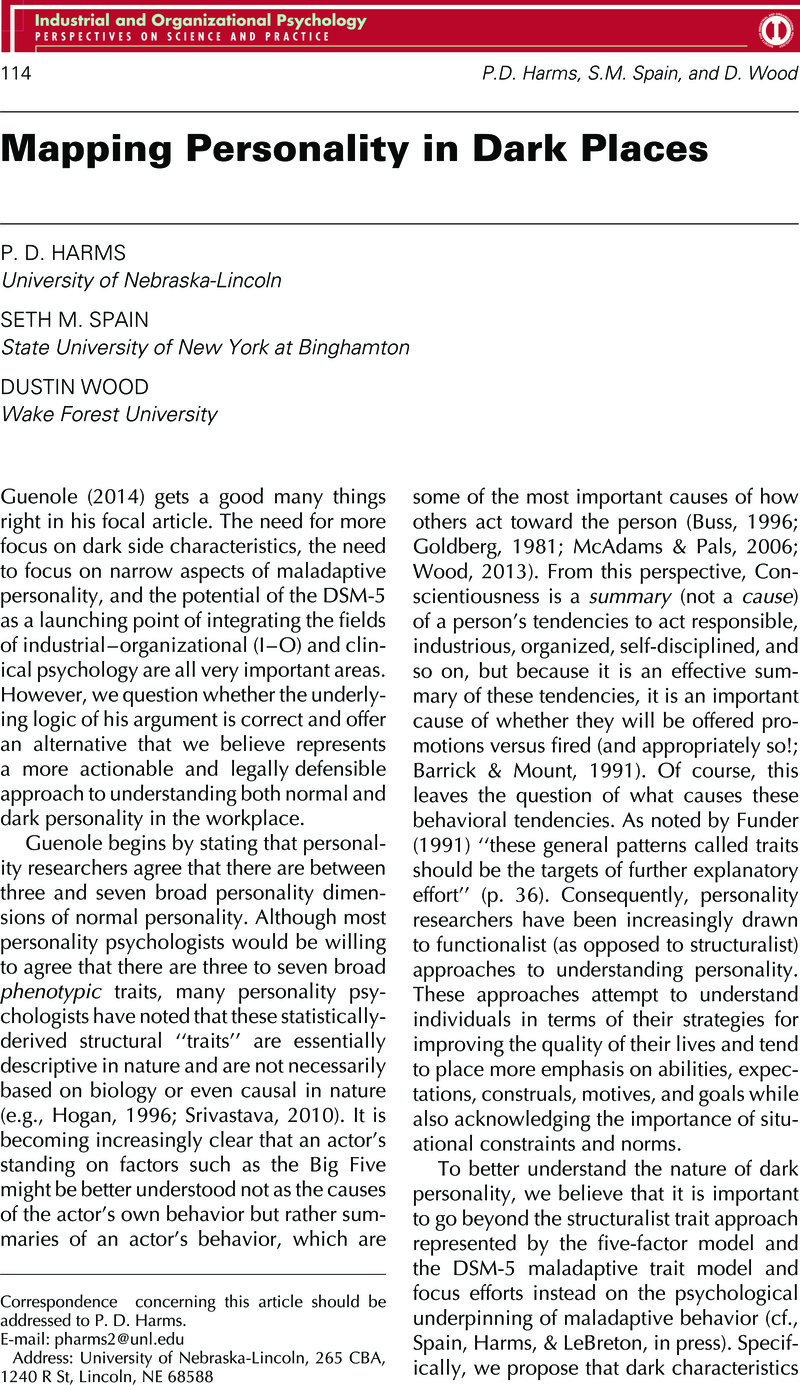Crossref Citations
This article has been cited by the following publications. This list is generated based on data provided by Crossref.
Harms, P. D.
and
Spain, Seth M.
2014.
Follower Perceptions Deserve a Closer Look.
Industrial and Organizational Psychology,
Vol. 7,
Issue. 2,
p.
187.
Harms, P.D.
and
Spain, Seth M.
2015.
Beyond the Bright Side: Dark Personality at Work.
Applied Psychology,
Vol. 64,
Issue. 1,
p.
15.
Spain, Seth M.
Harms, P. D.
and
Wood, Dustin
2016.
The Role of Leadership in Occupational Stress.
Vol. 14,
Issue. ,
p.
33.
Harms, P. D.
and
Wood, Dustin
2016.
Bouncing Back to the Future: A Look at the Road Ahead for the Assessment of Resilience.
Industrial and Organizational Psychology,
Vol. 9,
Issue. 2,
p.
436.
Nübold, Annika
Bader, Josef
Bozin, Nera
Depala, Romil
Eidast, Helena
Johannessen, Elisabeth A.
and
Prinz, Gerhard
2017.
Developing a Taxonomy of Dark Triad Triggers at Work – A Grounded Theory Study Protocol.
Frontiers in Psychology,
Vol. 8,
Issue. ,
Rogers, Katherine H.
Le, Marina T.
Buckels, Erin E.
Kim, Mikayla
and
Biesanz, Jeremy C.
2018.
Dispositional malevolence and impression formation: Dark Tetrad associations with accuracy and positivity in first impressions.
Journal of Personality,
Vol. 86,
Issue. 6,
p.
1050.
Schyns, Birgit
Wisse, Barbara
and
Sanders, Stacey
2019.
Shady Strategic Behavior: Recognizing Strategic Followership of Dark Triad Followers.
Academy of Management Perspectives,
Vol. 33,
Issue. 2,
p.
234.
Harms, P. D.
Wood, Dustin
and
DeSimone, Justin A.
2019.
Just because it’s dark doesn’t mean that we can’t go there.
Industrial and Organizational Psychology,
Vol. 12,
Issue. 2,
p.
206.
Spain, Seth M.
2019.
Leadership, Work, and the Dark Side of Personality.
p.
19.
Spain, Seth M.
2019.
Leadership, Work, and the Dark Side of Personality.
p.
41.
Wiens, Thomas K.
and
Walker, Lawrence J.
2019.
Examining the relationship between bright and dark personality traits in two management samples.
Personality and Individual Differences,
Vol. 141,
Issue. ,
p.
92.
SET, Zeynep
2020.
Sosyal Kötücül Kişilikler: Karanlık Üçlü.
Psikiyatride Güncel Yaklaşımlar,
Vol. 12,
Issue. 3,
p.
318.
YÜCEL, Esin
2020.
Kişiliğin Karanlık Üçlüsü: Turizm Sektöründe Demografik Değişkenler Açısından Bir İnceleme.
Seyahat ve Otel İşletmeciliği Dergisi,
Vol. 17,
Issue. 1,
p.
71.
Harms, P.D.
Patel, Pankaj C.
and
Carnevale, Joel B.
2020.
Self-centered and self-employed: Gender and the relationship between narcissism and self-employment.
Journal of Business Research,
Vol. 121,
Issue. ,
p.
170.
Harms, P.D.
and
A. Sherman, Ryne
2021.
Measuring and Modeling Persons and Situations.
p.
33.
Harms, P.D.
Marbut, Alexander
Johnston, Allen C.
Lester, Paul
and
Fezzey, Tyler
2022.
Exposing the darkness within: A review of dark personality traits, models, and measures and their relationship to insider threats.
Journal of Information Security and Applications,
Vol. 71,
Issue. ,
p.
103378.
Dasborough, Marie T.
Ashkanasy, Neal M.
Humphrey, Ronald H.
Harms, P.D.
Credé, Marcus
and
Wood, Dustin
2022.
Does leadership still not need emotional intelligence? Continuing “The Great EI Debate”.
The Leadership Quarterly,
Vol. 33,
Issue. 6,
p.
101539.
Harms, P. D.
2022.
Bad Is Stronger Than Good.
Zeitschrift für Psychologie,
Vol. 230,
Issue. 4,
p.
280.
Braun, Susanne
Sleebos, Ed
Zou, Leah L.
and
Wisse, Barbara M.
2024.
Sparking or smothering darkness: Motivational climates influence the leader grandiose narcissism–follower trust relation via leader self‐serving behaviour.
Journal of Occupational and Organizational Psychology,
Harms, P.D.
White, Joshua V.
and
Fezzey, Tyler N.A.
2024.
Dark clouds on the horizon: Dark personality traits and the frontiers of the entrepreneurial economy.
Journal of Business Research,
Vol. 171,
Issue. ,
p.
114364.



